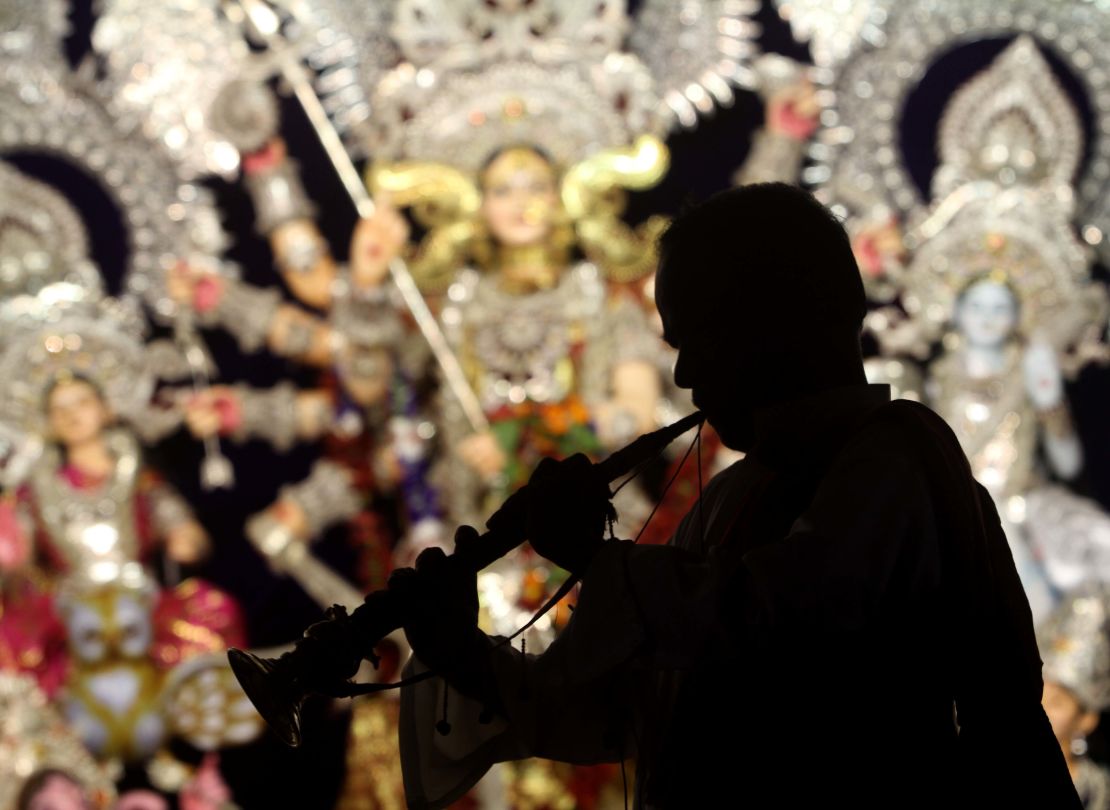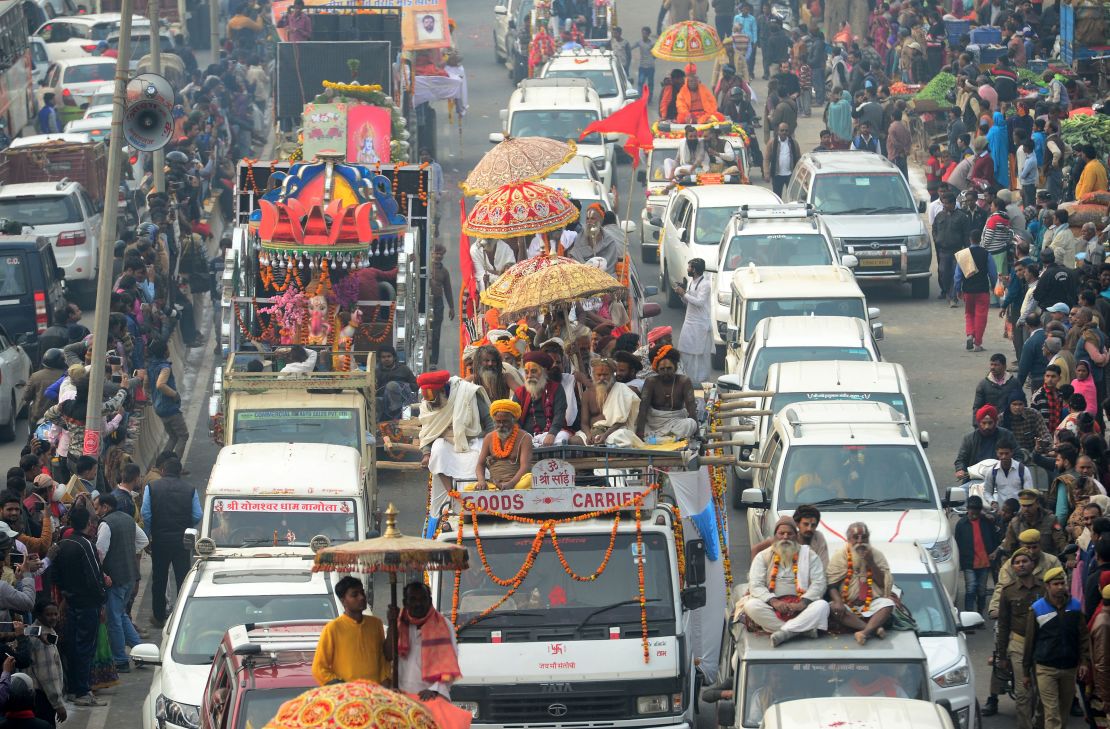“Anyone who doesn’t believe in our values and wants to go to Pakistan is welcome to go,” cries a voice in Hindi, over a thumping electronic beat. “We won’t stop them, we will even pay for their ticket!”
The track, which blends techno and trance, traditional Indian and religious folk music, and political sloganeering – at another point, a voice shouts “Hail Hindustan!” – has nearly nine million views on YouTube. Uploaded by a 20-year-old musician who goes by the name DJ Lucky, its title translates as “100% guarantee all Hindu brothers will dance continuously to this track.”
This is Bhakti Vibration – an intense new electronic music genre out of Uttar Pradesh, in northern India, known for remixing speeches by religious leaders, Bollywood stars and politicians, including Indian Prime Minister Narendra Modi. While some of the tracks are focused on Bhakti, Hindu devotional music, others take a far more political, often stridently nationalist tone.
The thumbnail for a track by DJ Sandeep, a musician based in Faizabad in Uttar Pradesh, with more than three million YouTube views, reads “Muslims better stay away,” while the title translates as, “After watching this video all Pakistanis will be affected.” It samples patriotic Bollywood films and political speeches about sacrificing one’s life for the nation.
Despite the strong political overtones of many Bhakti Vibration tracks, including his own, DJ Lucky denies that he is creating anything but entertainment.
“I don’t make music to spread hatred, as an artist I make music that the people like and I like,” he told CNN. On recent uploads, he’s taken to including the all-caps disclaimer, “NO INTENTIONS TO HURT ANY RELIGIOUS or SENTIMENTS OR DISRESPECT ANY PERSON OR ANY VIEW IN ANY ASPECTS.”
But to its critics, Bhakti Vibration is anything but harmless. They see it as part of a rising tide of anti-Muslim sentiment in India, one that has already sparked brutal lynchings and mob attacks.

Religious devotion and communal tension
Most of the DJs making Bhakti Vibration tracks are young men in their teens and early twenties. In recent years, they have formed a strong online community, sharing tips on editing, production, and how to promote their music on YouTube.
The most popular songs coming out of the new genre focus on religious devotion, and comments under the YouTube videos often praise Hindu gods and call for unity among Hindus.
But to engage their followers and get maximum reach online, DJs often choose provocative titles and samples for their tracks.
Bhakti Vibration also has a Islamic counterpart: Miya Bhai (Fellow Muslim Brother) Electronica. Raza-e-Mustafa Group – a channel dedicated to it, has close to 27 million YouTube views, while Miya Bhai Electronica artist DJ Uvesh has racked up nearly six million.
The tracks remix Sufi Islamic devotional music, sample political dialogues and use repetitive slogans like “Nara-e-Takbeer,” or “God is Great.” With titles like “DJ Qawwali AK 47 mix” – in which gunshots are sampled alongside Sufi music – some tracks are as combative as Bhakti Vibration.
Shabnam Hashmi, a Muslim activist and founder of Act Now for Harmony and Democracy (ANHAD), a human rights group, said both sides are responding to an increase in communal tensions in recent years.
Indian Home Office data reported 111 deaths in 822 incidents of communal violence throughout the country during 2017, a 29% increase in deaths and a 17% increase in incidents as compared to 2016, when the figures were 86 and 703, respectively. This increase is largely in line with rising communal violence under both the current and previous governments, apart from a brief drop around 2014.
According to Hashmi, “both (Bhakti Vibration and Miya Bhai) are very dangerous,” though she points out the audience for Miya Bhai Electronica is arguably more limited.
India’s population of approximately of 1.3 billion is made up of a Hindu majority of around 80%, as well as a large Muslim minority of some 185 million, or about 15% of the total.

Good vibrations
If Bhakti Vibration has a home, it’s Allahabad, officially known as Prayagraj, a city in Uttar Pradesh which plays host to some six hundred DJs.
From mid-January, the city will play host to Kumbh Mela, one of the largest religious pilgrimages in the world. Millions of Hindus are expected to flood into Allahabad during a three-month period.
In October 2018, the state government, led by Modi’s Bharatiya Janata Party (BJP), officially renamed Allahabad, dropping the moniker bestowed upon it by the Mughal Empire, a Muslim dynasty which ruled much of India for several centuries. The new name, Prayagraj, means “place of sacrifice” in Sanskrit, and was seen by many as motivated by Hindu nationalism, or Hindutva: an ideology focused on reframing India’s historically diverse, multi-faith culture and history as a distinctly Hindu one.
For many Muslims, these name changes are part of a growing trend, where not just Muslim names, but also Muslim people, are unwelcome in the new India.
DJ Deepu is an up-and-coming star in the Prayagraj scene who started learning how to remix songs at the age of 15. Now 18, he runs his own studio in the city and teaches others how to DJ. At Bhakti Vibration events, he engages in DJ battles, facing off against another musician while a crowd dances in the middle.
“The crowd wants to feel the vibrations, so whoever is able to produce the highest and the nicest vibrations wins,” Deepu told CNN.
Like DJ Lucky, Deepu’s success is fueled by a large YouTube following, though his is mainly focused in Prayagraj. Now a local celebrity, he is paid by event organizers or residential communities who hire DJs for religious festivals.
“We don’t play music in clubs or pubs – there are none in Allahabad. We play it for the crowd and our crowd loves to vibrate,” he said. “But since I have a studio I can participate in bigger projects now.”
His most recent project was a song for a political party, which he declined to share with CNN. “It’s mainly filled with slogans,” Deepu said.
‘Part of a larger trend’
Music and Hindu nationalism have a long, complex history, said Richard Williams, a lecturer in ethnomusicology at SOAS, University of London.
“From the early nineteenth century onwards, many Hindu music scholars in North India have denounced Muslim musicians, and blamed them for the alleged ‘degeneration’ of classical music,” he said.
“Since then, Muslim musicians have routinely been side-lined in histories of Indian music, and reformist groups have successively attempted to ‘purify’ Hindustani classical music as a form of sacred, i.e. Hindu, music.”
While many Bhakti Vibration DJs don’t see themselves as motivated by communalism, Williams said it was “fair to say they’re responding to a popular demand for anti-Muslim, anti-Pakistan media. This is part of a larger trend.”
But DJ Lucky doesn’t see anything wrong with Bhakti Vibration and rejects the suggestion it is intentionally provocative.
“I make music because I like it, it’s my passion and hobby,” he said. While he said it can be taken too far, referencing an incident in which Bhakti Vibration was played outside a mosque, Lucky said it was not his intention to promote hate.
“No DJ would play music which would upset others or give problems to others,” he said.



